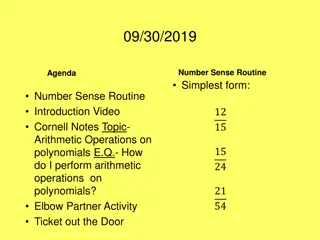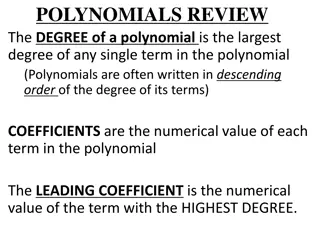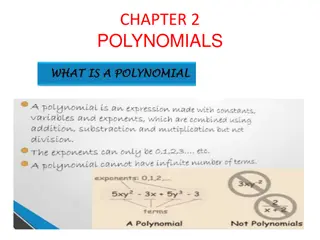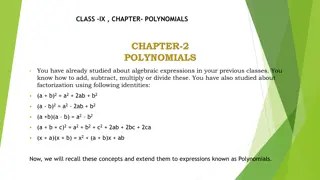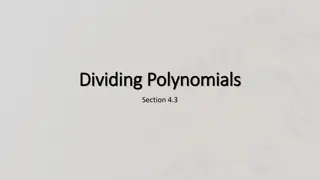Zeroes of Polynomials - Grade 9 Chapter 2
Zeroes of a polynomial are the values of the variable that make the polynomial equal to zero. This concept is explored in Grade 9 Chapter 2, where students learn how to find the zeroes of a polynomial by equating it to zero. Through examples like p(x) = x - 4, students understand how to determine the zeroes of a polynomial and their significance. The concept of zeroes, roots, and the properties related to them are explained, helping students grasp the fundamentals of polynomials.
Download Presentation

Please find below an Image/Link to download the presentation.
The content on the website is provided AS IS for your information and personal use only. It may not be sold, licensed, or shared on other websites without obtaining consent from the author.If you encounter any issues during the download, it is possible that the publisher has removed the file from their server.
You are allowed to download the files provided on this website for personal or commercial use, subject to the condition that they are used lawfully. All files are the property of their respective owners.
The content on the website is provided AS IS for your information and personal use only. It may not be sold, licensed, or shared on other websites without obtaining consent from the author.
E N D
Presentation Transcript
Polynomials Grade 9 Chapter 2
Zeroes of a Polynomial: Zeroes of a Polynomial: Zeroes of a polynomial p(x) is a number a such that p(a) = 0. If p(x) is a polynomial then the number a will be the zero of the polynomial with p(a) = 0. We can find the zero of the polynomial by equating it to zero.
Example: 1 Given polynomial is p(x) = x - 4 To find the zero of the polynomial we will equate it to zero. x - 4 = 0 x = 4 p(4) = x 4 = 4 4 = 0 This shows that if we place 4 in place of x, we got the value of the polynomial as zero. So 4 is the zero of this polynomial. And also we are getting the value 4 by equating the polynomial by 0. So 4 is the zero of the polynomial or root of the polynomial.
Note Zero may be a zero of a polynomial. Every linear polynomial has one and only one zero. Zero of a polynomial is also called the root of the polynomial. A non-zero constant polynomial has no zero. Every real number is a zero of the zero polynomial. A polynomial can have more than one zero. The maximum number of zeroes of a polynomial is equal to its degree.




